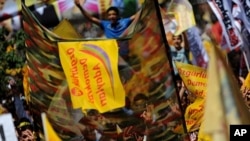A Turkish parliamentary vote of confidence for a new government was marred Wednesday by a boycott of pro-Kurdish deputies protesting the jailing of six of their colleagues. The protests came as tensions rise over Kurdish demands for greater rights.
Turkey's ruling AK Party comfortably secured a vote of confidence for a new government with 322 votes out of 522. But pro-Kurdish deputies of the BDP refused to take their parliamentary oath to protest the jailing of six of their colleagues.
Before the vote, Parliament Speaker Cemil Cicek organized a meeting of AK party deputies and BDP leaders Selahattin Demirtas and Gultan Kisanak to end the boycott. But the effort failed, with Demirtas saying that there was no movement from the government. He said his party is open to more talks.
Demirtas said Turkey's biggest problems can be solved through dialogue, discussion and trying to understand one another.
The BDP party won 36 seats in last month's elections. The pro-Kurdish deputies are calling for the government to introduce legal reform to secure the release of five deputies being held under Turkey's anti-terror laws.
A sixth imprisoned Kurdish deputy, Hatip Dicle, lost his seat because of a conviction for a speech he made that was considered seditious.
Political scientist Cengiz Aktar says the government must resolve the boycott, if it wants to achieve its goal of constitutional reform.
"The third AK government will not be able to go ahead with a new constitution, which needs maximum consensus, in particular with the Kurds," said Aktar. "No one can impose his own solution to the Kurdish conflict. If the Kurdish conflict will be resolved one day, it will be through widespread dialogue."
Prime Minister Recep Tayyip Erdogan called for the pro-Kurdish deputies to end their boycott, saying their input is needed for the writing of a new constitution. Erdogan has committed his government to replacing the present constitution, which was written by the country’s former military government. Most analysts blame the constitution for many of Turkey's problems, in particular the treatment of the country's Kurdish minority, which makes up about 20 percent of the population.
Mr. Erdogan has stressed the need for consensus he has not intervened in the jailing of pro-Kurdish deputies. The imprisoned leader of the Kurdish rebel group the PKK, Abdullah Ocalan, has called for an end to the boycott.
Political columnist Asli Aydintasbas of the Turkish Milliyet newspaper says that puts the Kurdish deputies in a difficult position.
"They are caught between a rock and hard place, they do not want to go in," said Aydintasbas. "Clearly, they go in without any clear concessions about their imprisoned friends from the government. On the other hand, they have this order from Ocalan, so they are in very very difficult place."
Analysts say the European Court of Human Rights, of which Turkey is a member, might offer a way out of the impasse. The Kurdish deputies have filed a case with the court.
But even under its accelerated process, it likely will take months before a decision is reached.
The Kurdish deputies are also being pressured from the wider Kurdish-rights movement, which is calling on deputies to take their campaign outside of parliament as demands grow for a declaration of democratic autonomy.
Political columnist Asli Aydintasbas:
"If Kurds today wanted to do acts of civil disobedience in Istanbul, Ankara, and Diyarbakir, believe me, it would have no less of an effect than Tahrir Square [in Egypt," he said.
The PKK Kurdish rebels who are fighting the Turkish state have stepped up their operations this month with the killing of two Turkish soldiers and the kidnapping of another. Analysts say how the Kurdish parliamentary boycott is resolved might determine the future of the country's new parliament.
Turkey's Pro-Kurd Boycott Continues Despite Confidence Vote for Government
- By Dorian Jones














